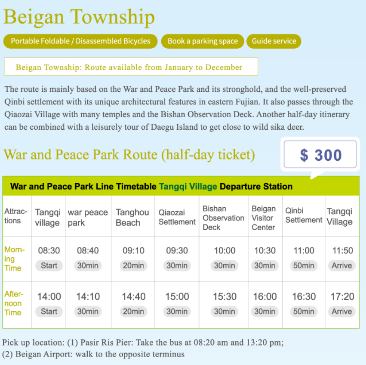Pitfalls of machine translation
« previous post | next post »
[This is a guest post by Thomas Batchelor]
I was recently looking at a tourist bus around the Matsu Islands of Taiwan, and they have a timetable online with the route and locations for picking up passengers, as below.
[VHM: Don't trouble yourself by trying to read the fine print of the schedule itself. Just pay attention to the note about the pickup location at the bottom of the schedule, which is enlarged below the fold.]

Trying to figure out where to be picked up for the tour bus, I noticed at the bottom that the first pick up location is listed as ‘Pasir Ris Pier’. Now for anyone familiar with Taiwan, this does not sound like a Mandarin place name, let alone Hokkien or even any Indigenous languages (especially being on the Matsu Islands, which are not part of ‘Taiwan’ per se).
Not being sure where this was meant to be, I looked up the name, and it turns out to be a district in Singapore. The district of Singapore uses the Malay name, Pasir Ris, as its ‘English’ name as well. I then noticed that the Mandarin name for the district in Singapore happens to be Baisha 白沙. And what happens to be the name of a harbour with ferries and a small bus stop in the Matsu Islands? Baisha Harbour 白沙港.
It seems like someone put the original Mandarin timetable through a machine translator or AI, which found that the ‘English’ name for a place named 白沙 must be the most common one: Pasir Ris. This was then put into the timetable, seemingly without being checked, leaving us English-speaking tourists to be left wondering where the mystery pick up location is.
I thought this was an interesting little example of machine translation confusion! Hopefully not too many tourists have been waylaid by this mistake.
[end of guest post]
——
Good investigation by Thomas Batchelor.
Ben Zimmer added the following valuable information concerning "Pasir Ris":
There are a few different theories about the origins of "Pasir Ris," but nothing definitive. Wikipedia says:
The first reference to a village of Pasir Ris, Passier Reis (or Passier Rice), appeared in early 1800s. The second part of the city name, Ris, in Malay, means bolt rope. Pasir Ris may also mean "white sand" in Malay. Pasir Ris Town is named after the long stretch of sandy white beach along the north-east coastline of Singapore, facing Pulau Ubin.
References:
Ng Yew Peng (2018). Tay Yu Shan (ed.). What's In The Name? How The Streets And Villages In Singapore Got Their Names. World Scientific. ISBN 978-981-32-2139-0. OCLC 990571127
"Pasir Ris". Retrieved 9 July 2018.
Some other sources suggest the "bolt-rope" meaning of ris in the place name relates to the narrowness of the beach. Ris does show up with that meaning in Richard James Wilkinson's A Malay English Dictionary (1901), but it is now just a historical usage.

The book Loan-words in Indonesian and Malay suggests that ris or aris for "bolt-rope" is based on Portuguese rizes, defined here as "lanyard, securing rope." Elsewhere rizes is given as the Portuguese equivalent of English reef meaning "a part of a sail that can be tied or rolled up to make the sail smaller in a strong wind."
None of that has anything to do with rice, apparently. (The old variant spelling of Pasir Ris as Passier Rice is likely just a Hobson-Jobsonism.)
Selected readings
- "Why electronic machine translation services sometimes seem to fail" (1/29/17)
- "One's deceased father grind" (9/18/14)
- "Machine accepts reincarnation" (11/1/15)
- "Colossal translation fail at the Boao Forum for Asia" (4/13/18)
- "'Do not accept Taiwan'" (2/1/19)

AntC said,
August 29, 2024 @ 4:38 pm
the Matsu Islands, which are not part of ‘Taiwan’ per se
I'm not sure that's a happy way to put the situation. I hope the PRC doesn't overhear that comment, and read it as Matsu is not even part of 'Chinese Taipei'. There's already been two international crises over its status, leading to two U.S. Presidents making commitments to defend it. Despite that there are continuing skirmishes between fishing vessels and military patrol boats (from both sides).
M. Ling 莫齡 said,
August 29, 2024 @ 11:11 pm
@ AntC
The Matsu islands are not physically part of the actual island of Taiwan, which is what comes to mind for most people when they hear "Taiwan".
Chas Belov said,
August 30, 2024 @ 1:48 am
The Singapore connection made me suspicious of the Bishan Observatory Deck – Bishan being a neighborhood in Singapore – but I see from Apple Maps that Matsu has a Bishan Road and recognizes the observatory as a point of interest on Matsu although I have to search for it.
David Morris said,
August 30, 2024 @ 4:38 am
There must be a limited number of piers on an island that size.
Peter Taylor said,
August 30, 2024 @ 4:50 am
I thought that the confusion was going to be about "Walk to the opposite terminus", which is presumably incorrect advice 50% of the time.
John Swindle said,
August 31, 2024 @ 4:18 am
As to whether Matsu is part of Taiwan, I think the ROC and the PRC both regard Kinmen and Matsu as part of Fujian (Fuchien) Province, not Taiwan Province. Tiny parts of Fujian that happen to be governed from Taipei.
Mich said,
September 2, 2024 @ 8:33 pm
Grew up in Malaysia, living in Singapore. 'Pasir' definitely means 'sand', but I've never heard of 'ris' meaning 'white', it's always only been 'putih'.